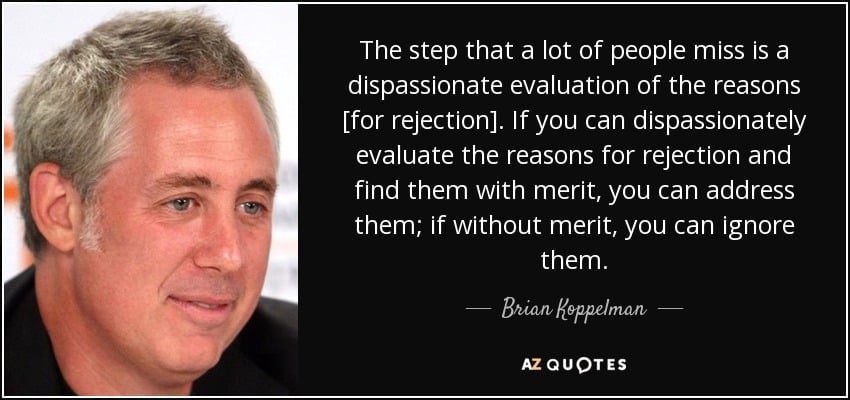The following is from guest writer, Ed Russo.
Organizational success depends on collaborative efforts where leaders solicit feedback from their team. Once they receive this feedback, leaders have options for what to do with the information collected. Blindly accepting the feedback undermines the creative process and deviates from your vision, mission, and values. Blindly rejecting it makes you closed-minded and unwilling to consider others’ opinions. Doing nothing with the feedback discourages others from continuing to contribute.
According to Brian Koppelman, writer and director of such classic movies as Rounders and Ocean’s Thirteen plus has a popular Vine series called Six Second Screenwriting Lessons, not all feedback is created equal.
If you can dispassionately evaluate the reasons for rejection and find them with merit you can address them. Without merit you can ignore them. Although it always stings, it’s emotionally dispiriting when you face rejection. If you can step back and make an analysis and a game plan you can then find a path forward.
Criticism and negative feedback need to be analyzed. You have already scrutinized and, in some cases, agonized over your work through several edits and re-writes prior to sharing.
If you’re rigorous in your own [research and development] in whatever your area is and you do your own testing and you really stress test the thing that you do… I think it gives you a tremendous amount of inner fortitude when you come up against the monolith.
The Game author, Neil Strauss, gives the catcher’s mitt example. You accept feedback in your mitt. Then you look at it. If it’s true you accept it and put it in your head. If you’re not sure, share the feedback with a few other people to see what they think. If the same feedback that you reject keeps coming back to you it is time to re-evaluate.
And then you can get a real epiphany that changes you. That’s where growth is.
Douglas Stone, a lecturer at Harvard Law School and co-author of Thanks for the Feedback was recently quoted as saying, “Some people distort feedback into a devastating personal critique.” In response, Douglas suggests writing down what the feedback is about and what it’s not about. Then, once our thoughts are organized, we can “get the feedback back into the right-sized box” and use the feedback in a constructive manner.
Journalists aim to be dispassionate observers, objective and unbiased. Leaders who use this lens will be consistent and avoid knee-jerk reactions. The next time you receive feedback apply the following steps.
- Analyze criticism before accepting it.
- Get a second, third, fourth opinion.
- Be ready to change if you keep hearing the same criticism.
- Don’t waste reviewers’ time if you have no intention of considering feedback.
Being criticized, receiving negative feedback doesn’t have to suck. Dispassionate evaluation gives you the tools to assess what is coming back to you. Brian Koppelman values others’ opinions without compromising his values. Do you?
________
Ed Russo is the Program Manager for the National Center for Missing and Exploited Children. Mr. Russo works with educators, law enforcement, community leaders, and government officials to implement child safety resources into schools and communities across the country. Through presentations and trainings, Mr. Russo provides participants with information about how safety resources can help prevent the victimization of children. Prior to joining the Center he was a Human Resources Manager in a Florida County Clerk’s Office and has over 18 years of teaching experience. Mr. Russo is a graduate of the University of Rhode Island with a BS degree in Education.
Mr. Russo can be contacted through Twitter and LinkedIn.





